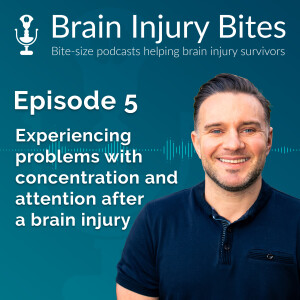Tuesday Dec 07, 2021
Experiencing problems with concentration and attention after a brain injury.

In this episode of Brain Injury Bites, Brooke Trotter and Ashwini Kamath delve into how brain injury impacts attention, concentration, and cognitive load – and how even small tasks can become overwhelming without the right strategies.
Brooke shares how his concentration was reduced to just seconds after his injury, and how he gradually rebuilt it with help from neuropsychologists, repetition, and a lot of patience. From multitasking myths to exploring the benefits of driving with the radio off, this episode delves into how attention works and how it can be retrained. They discuss:
- Why multitasking is a myth, especially after brain injury
- How distractions can derail tasks and how to minimise them
- The power of repetition, alarms, and rigid structure
- Strategies for improving focus, including film-watching exercises
- How fatigue and cognitive overload make everything harder
- Tips for driving, socialising, and getting through the day with more mental clarity
With humour, honesty, and real-life stories, Brooke and Ashwini offer clear advice for anyone struggling with concentration after a brain injury — or for those supporting someone who is.
Chapter Markers:
00:00 - Introduction: How Brain Injury Affects Cognitive Function
04:45 - Why Multitasking Doesn’t Work After a Brain Injury
06:37 - Returning to Driving and Managing Cognitive Load
09:11 - Planning Activities in Short Bursts to Avoid Burnout
10:13 - Tips and Advice for Improving Concentration Day to Day
Resources:
Helpful links:
For a transcript, follow the link below:
To keep up to date with our podcast, follow us on our social media accounts:
Community Compass app!
Brain Injury Bites is now part of the Community Compass app! Download now and take the first step toward reclaiming your best life - because you’re not alone in this journey.
Notice:
Information and other content provided in this Podcast should not be taken as providing medical advice or recommendations. Please always consult your doctor or treating team for medical advice.
No comments yet. Be the first to say something!